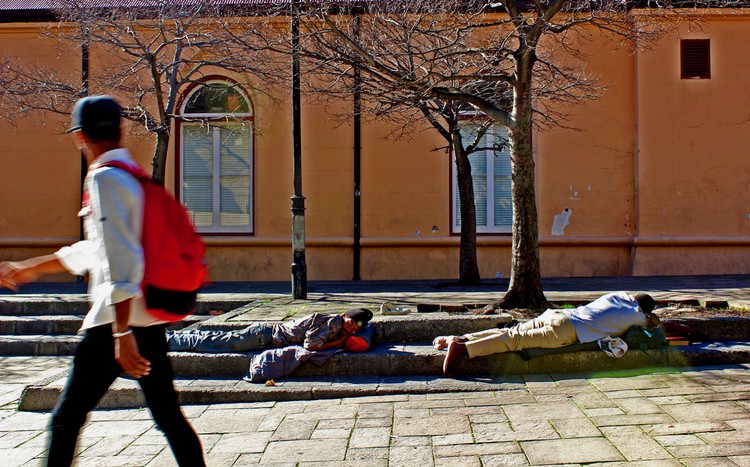Councillor defends Cape Town’s record on homeless people
“Cape Town sprang into action, reaching roughly double the number of homeless persons compared to the whole of Gauteng”
“The City drives a range of initiatives to assist street people and the organisations who care for them,” writes Councillor Zahid Badroodien. Archive photo: Masixole Feni
The City of Cape Town achieved South Africa’s highest service reach to the homeless during the national lockdown period levels 4 to 5, when regulations specifically instructed municipalities to immediately shelter homeless people amid health risks.
Remember, those were the days when Covid-19 was rapidly spreading across the globe, when the infection rate in Italy loomed large and we braced for the worst scenario against an as yet undefined threat.
As a caring and capable state, Cape Town sprang into action, reaching roughly double the number of homeless persons compared to the whole of Gauteng according to the National Department of Social Development report to Parliament in April 2020.
The City’s response certainly was “unique”, as per the latest political attack on us for acting in the greater good and in line with national disaster regulations (see: Cape Town’s approach to homeless people is cruel and expensive by Brett Herron). The author is at least honest in acknowledging “there are few cities around the world that don’t have homeless people” and that South African metros were subject to “hurriedly implemented lockdowns to manage the Covid-19 pandemic”.
Cape Town’s visible service delivery to homeless persons has attracted more opportunistic attack than the combined failure of all other metros to even bother about this most vulnerable of sectors.
But yet everywhere, except Cape Town, it seemed to be a case of out of sight, out of mind when it comes to the homeless.
Nevertheless, let’s recap what was actually achieved in Cape Town during April to May this year as the world turned upside down:
- 1,352 homeless persons were provided with chronic and clinical treatment for conditions like TB, HIV, Diabetes, Hypertension and Epilepsy.
- 272 people were tested for TB and 1 858 people screened for Covid-19.
- Over 120 people re-integrated with their families.
- 4,500 meals were issued a day.
- 2,000 mattresses and 2,000 blankets were procured and distributed to every person.
- There were psycho-social services for substance users as part of the rehabilitation process.
Opportunists of all stripes have tried to smear the City’s efforts, but what remains is the legacy of this service reach, especially the hundreds of people enrolled on the public health system for chronic medication. These are conditions that would likely have gone unchecked on the streets.
Under pressure due to corruption allegations in their party leader’s national Public Works ministry, the GOOD party has gone on the loose cannon offensive, unfortunately without the facts required for an honest public conversation.
While this party questions the City’s expenditure on the homeless, we are in fact grateful for every cent spent in our caring City’s efforts to help the most vulnerable in our society.
Emergency procurement processes were followed in terms of the Supply Chain Management Policy, the National Treasury and the Municipal Finance Management Act to avert human suffering. Furthermore, all Covid-19-related procurement tenders and requests for information has been published on the City’s website as part of our commitment to be transparent and accountable to members of the public.
All of Cape Town’s social development efforts are geared towards making a positive difference. This includes our Street People Unit and policy participation focus; the R20 million in grant funding released to NPOs during lockdown; the work we’ve done outside of our constitutional mandate to expand shelters operating on City land; the rates relief we’ve provided to good people running shelters; and the scores of homeless persons we’ve been privileged enough to reunite with family in recent times.
But, as the old saying goes, no good deed goes unpunished. And so there will always be the political and civil society opportunists who are desperate to misrepresent us.
While local governments do not have a constitutional mandate over welfare or homelessness specifically, the City drives a range of initiatives to assist street people and the organisations who care for them precisely because we are a caring city.
We further work with provincial and National Social Development departments on issues such as expanding Safe Spaces and shelters.
We are currently updating our Street People policy in consultation with a range of stakeholders across society.
Let us commit to driving meaningful solutions and rejecting opportunism.
Views expressed are not necessarily GroundUp’s.
Support independent journalism
Donate using Payfast

Don't miss out on the latest news
We respect your privacy, and promise we won't spam you.
Next: ANC infighting blamed for halted Ekurhuleni water project
Previous: Foster parents distraught after not receiving grants this month
© 2020 GroundUp. This article is licensed under a Creative Commons Attribution-NoDerivatives 4.0 International License.
You may republish this article, so long as you credit the authors and GroundUp, and do not change the text. Please include a link back to the original article.

